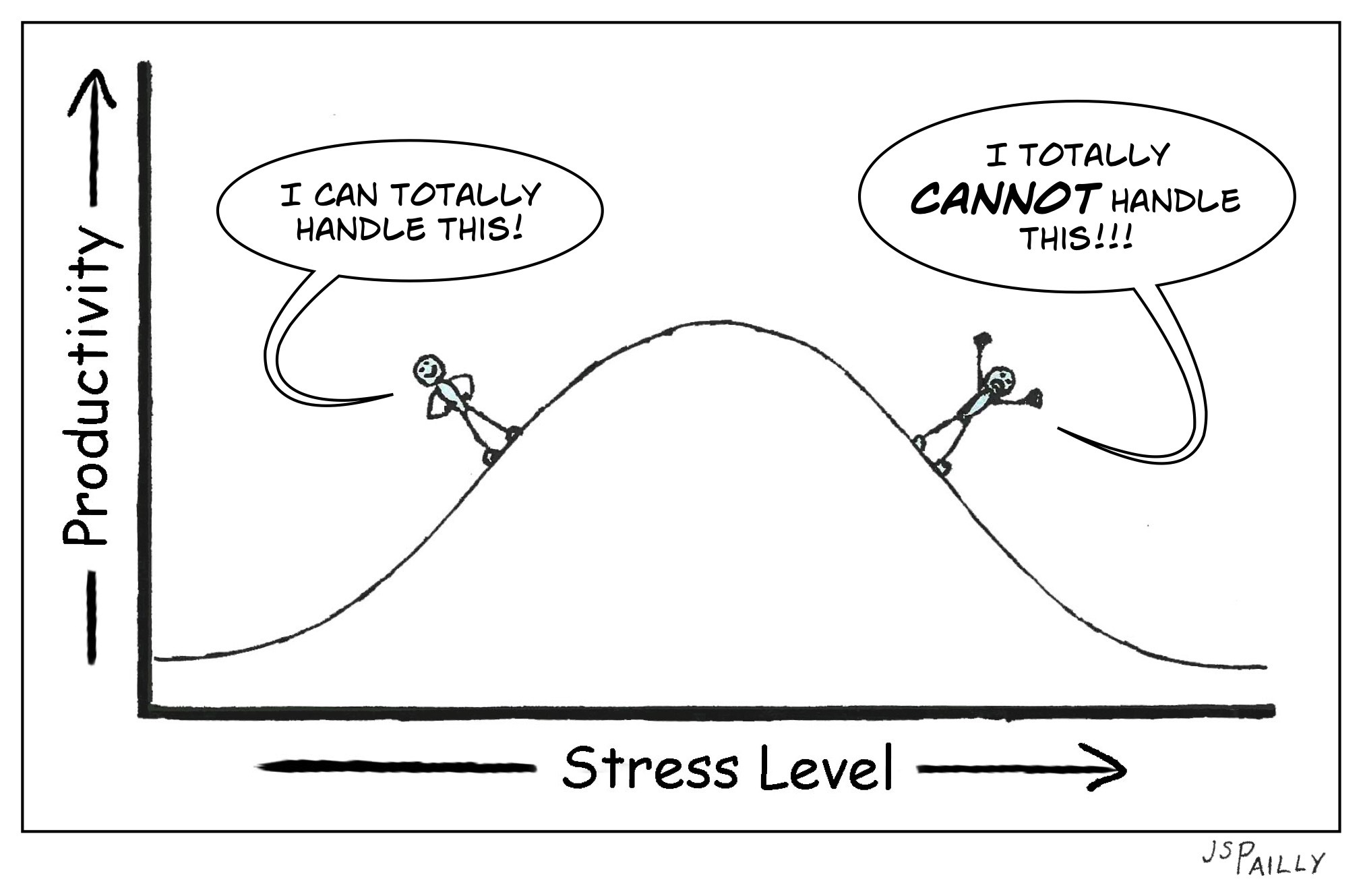Photo by bongkarn thanyakij from Pexels
One Simple Step Busy Leaders Must Take to Leverage Their Time
As a busy leader, I know you want to feel productive, effective, and accomplished each
day. This means you must leverage your time!
In this blog article, I will share one simple step you must take to help make this happen.
You may think I’m going to share a tip about time management or email management or
task management or calendar management. While all of these strategies can help to
leverage your time, I’m talking about a different kind of management.
Brain management! Specifically, brain chemistry management!
Let me explain.
As you can see in this illustration, if you want to operate at optimal levels of
performance, in any given moment, you must experience enough stress to be past the
green zone, but not so much stress that you operate from the red zone.

Ideally, you want to operate at the top of the curve, in your zone of high performance.
From a neuroscience perspective, when you do this, your Pre-frontal Cortex (your brain’s CEO, or executive functioning center), is in the right chemical balance. This allows you full access to your high-level functioning – things like clear thinking, strong focus, empathy, and good memory retrieval. In essence, when your PFC is chemically balanced, your brain is sharp. Sharp like a knife.
As Ann Betz explains in her article, “The Goldilocks of the Brain”, when your PFC is working optimally, the catecholamines dopamine and norepinephrine are in ‘just right’, perfect balance.
Conversely, if you operate with either ‘too little’ stress or ‘too much’ stress, this ‘just right’ amount of chemicals becomes unbalanced and the effect on your PFC is negative – it gets put into a state of distraction, disorganization, and forgetfulness. You experience things like foggy thinking and poor decision-making.
In essence, when you are overworked or bored, your PFC is operating like a dull knife. Quite literally, you become “stupid”!
And, if that’s not enough incentive to put ‘manage stress level’ at the top of your to do list, here’s another way to look at this:
Would you rather put in a highly productive 40-hour week where your PFC is operating at 100% capacity, OR, have to put in 54 hours because your PFC is only operating at 75% of its capacity?
Seems like a no brainer to me!
So, here are some tips on how you can help yourself optimize your PFC’s effectiveness:
1) Get clear on what your zone of high performance feels and sounds like.
Clients use these words to describe how it feels: calm, present, productive, energized, excited, clear, in control, centered, happy, engaged, collaborative, decisive, creative, confident, focused and alert.
Their bodies feel relaxed and grounded.
They think or say things such as:
“I’m firing on all cylinders!”
“I’m eager to get to work and do what’s next.”
“I feel good.”
“I’ve got this.”
2) Next, notice what ‘too little’ and ‘too much’ stress feels and sounds like.
In ‘too little’, clients use these words to describe how it feels: bored, apathetic, lazy, guilty, impatient, blah, uninspired, depressed.
Their bodies feel lethargic or sluggish.
They may think or say these things:
“I don’t get it.”
“I’m bored.”
“I can’t be bothered.”
“I’ll do it tomorrow.”
“I can’t seem to remember.”
In ‘too much’, clients use these words to describe how it feels: irritable, anxious, stressed, triggered, scattered, frustrated, distracted, overwhelmed, agitated, worried, impatient.
Their bodies feel tired or tense. Breathing might be shallow.
They may think or say things like:
“I SO need a holiday.”
“I’m SO done.”
“I can’t think anymore.”
“I don’t know where to start.”
“I have too many plates in the air.”
“I just can’t take it anymore.”
“I’m not sure what they expect from us around here.”
“I don’t know if I’m coming or going.”
“I don’t have time for this $%@*$!”

Photo source: Insta-stalker
3) Throughout your day, when you notice you are not operating in your zone of high performance, ask yourself:
What do I need to do right now to get to my optimal stress zone? Then do it.
Often simple strategies like this work immediately:
- Take a short walk outside
- Drink some water or eat a snack
- Adjust the temperature in the room
- Re-calibrate your to-do list
- Re-negotiate a deadline
Other times, you might need to commit to something that can be done later in your day, such as go for a run after work, or get to bed on time. If you are under-stressed, you likely need to increase demands to get in your optimal zone. For instance, you might have to create a deadline for one of your tasks or set a timer to challenge yourself to be as productive as possible in a certain time frame. Some of my clients find the Pomodoro Technique helpful for staying focused and sharp.
Of course, there is no ‘one size fits all’ strategy. What helps you stay ‘sharp and in the zone’ will be unique to you. I encourage you to experiment! I also highly recommend that you keep an image of the stress curve right in front of your nose. Mine is pinned above my laptop, so I can monitor where I am on the curve throughout my day, and self-correct more quickly.
Ultimately, it’s not busyness or the number of hours you work that leverages your effectiveness, it’s brainpower. So, lead your PFC! The more often you do this, the more you will operate from a higher level of consciousness or energetic frequency (e.g. calmness vs anxiety) which, over time, will allow you to realize even more of your full potential as both a busy leader, and a human being.
 Sandy Russell, CPHR, CPCC, PCC, CNTC, is a Workshop Leader, award winning Certified Coach and Chartered Professional in HR. Since 1995 she’s been empowering individuals, leaders and teams to leverage their potential and help create cultures where people are evolved, empowered, effective and engaged. Specialties include: people management, leadership effectiveness & consciousness, neuroscience, communication skills, career fulfillment/transition, personal leadership and team cohesion & development. To join Sandy’s mailing list or learn how you can work with her, please visit www.sandyrussell.ca. or reach out directly at 604-739-4780 or sandyrussell@telus.net.
Sandy Russell, CPHR, CPCC, PCC, CNTC, is a Workshop Leader, award winning Certified Coach and Chartered Professional in HR. Since 1995 she’s been empowering individuals, leaders and teams to leverage their potential and help create cultures where people are evolved, empowered, effective and engaged. Specialties include: people management, leadership effectiveness & consciousness, neuroscience, communication skills, career fulfillment/transition, personal leadership and team cohesion & development. To join Sandy’s mailing list or learn how you can work with her, please visit www.sandyrussell.ca. or reach out directly at 604-739-4780 or sandyrussell@telus.net.
Other Publications
Stay In Touch!
please reach out. Thanks!




